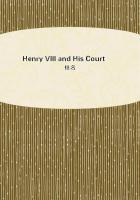Patrick sat beside his wife on a flat stone that had formerly supported the corner of the porch.His shoulder was close to Angelique's--so close that it looked almost as if he must have had his arm around her a moment before I came up.His passion and grief had calmed themselves down now, and he was quite tranquil.In his left hand he held the cake of Virginia leaf, in his right a knife.
He was cutting off delicate slivers of the tobacco, which he rolled together with a circular motion between his palms.Then he pulled his pipe from his pocket and filled the bowl with great deliberation.
"What a misfortune!" I cried."The pretty house is gone.I am so sorry, Patrick.And the box of money on the mantel-piece, that is gone, too, I fear--all your savings.What a terrible misfortune!
How did it happen?"
"I cannot tell," he answered rather slowly."It is the good God.
And he has left me my Angelique.Also, m'sieu', you see"--here he went over to the pile of ashes, and pulled out a fragment of charred wood with a live coal at the end--"you see"--puff, puff--"he has given me"--puff, puff--"a light for my pipe again"--puff, puff, puff!
The fragrant, friendly smoke was pouring out now in full volume.It enwreathed his head like drifts of cloud around the rugged top of a mountain at sunrise.I could see that his face was spreading into a smile of ineffable contentment.
"My faith!" said I, "how can you be so cheerful? Your house is in ashes; your money is burned up; the voyage to Quebec, the visit to the asylum, the little orphan--how can you give it all up so easily?""Well," he replied, taking the pipe from his mouth, with fingers curling around the bowl, as if they loved to feel that it was warm once more--"well, then, it would be more hard, I suppose, to give it up not easily.And then, for the house, we shall build a new one this fall; the neighbours will help.And for the voyage to Quebec--without that we may be happy.And as regards the little orphan, Iwill tell you frankly"--here he went back to his seat upon the flat stone, and settled himself with an air of great comfort beside his partner--"I tell you, in confidence, Angelique demands that Iprepare a particular furniture at the new house.Yes, it is a cradle; but it is not for an orphan."IV
It was late in the following summer when I came back again to St.
Gerome.The golden-rods and the asters were all in bloom along the village street; and as I walked down it the broad golden sunlight of the short afternoon seemed to glorify the open road and the plain square houses with a careless, homely rapture of peace.The air was softly fragrant with the odour of balm of Gilead.A yellow warbler sang from a little clump of elder-bushes, tinkling out his contented song like a chime of tiny bells, "Sweet--sweet--sweet--sweeter--sweeter--sweetest!"
There was the new house, a little farther back from the road than the old one; and in the place where the heap of ashes had lain, a primitive garden, with marigolds and lupines and zinnias all abloom.
And there was Patrick, sitting on the door-step, smoking his pipe in the cool of the day.Yes; and there, on a many-coloured counterpane spread beside him, an infant joy of the house of Mullarkey was sucking her thumb, while her father was humming the words of an old slumber-song:
Sainte Marguerite, Veillez ma petite!
Endormez ma p'tite enfant Jusqu'a l'age de quinze ans!
Quand elle aura quinze ans passe Il faudra la marier Avec un p'tit bonhomme Que viendra de Rome.
"Hola! Patrick," I cried; "good luck to you! Is it a girl or a boy?""SALUT! m'sieu'," he answered, jumping up and waving his pipe."It is a girl AND a boy!"Sure enough, as I entered the door, I beheld Angelique rocking the other half of the reward of virtue in the new cradle.
A BRAVE HEART
"That was truly his name, m'sieu'--Raoul Vaillantcoeur--a name of the fine sound, is it not? You like that word,--a valiant heart,--it pleases you, eh! The man who calls himself by such a name as that ought to be a brave fellow, a veritable hero? Well, perhaps.
But I know an Indian who is called Le Blanc; that means white.And a white man who is called Lenoir; that means black.It is very droll, this affair of the names.It is like the lottery."Silence for a few moments, broken only by the ripple of water under the bow of the canoe, the persistent patter of the rain all around us, and the SLISH, SLISH of the paddle with which Ferdinand, my Canadian voyageur, was pushing the birch-bark down the lonely length of Lac Moise.I knew that there was one of his stories on the way.
But I must keep still to get it.A single ill-advised comment, a word that would raise a question of morals or social philosophy, might switch the narrative off the track into a swamp of abstract discourse in which Ferdinand would lose himself.Presently the voice behind me began again.
"But that word VAILLANT, m'sieu'; with us in Canada it does not mean always the same as with you.Sometimes we use it for something that sounds big, but does little; a gun that goes off with a terrible crack, but shoots not straight nor far.When a man is like that he is FANFARON, he shows off well, but--well, you shall judge for yourself, when you hear what happened between this man Vaillantcoeur and his friend Prosper Leclere at the building of the stone tower of the church at Abbeville.You remind yourself of that grand church with the tall tower--yes? With permission I am going to tell you what passed when that was made.And you shall decide whether there was truly a brave heart in the story, or not; and if it went with the name.
Thus the tale began, in the vast solitude of the northern forest, among the granite peaks of the ancient Laurentian Mountains, on a lake that knew no human habitation save the Indian's wigwam or the fisherman's tent.















